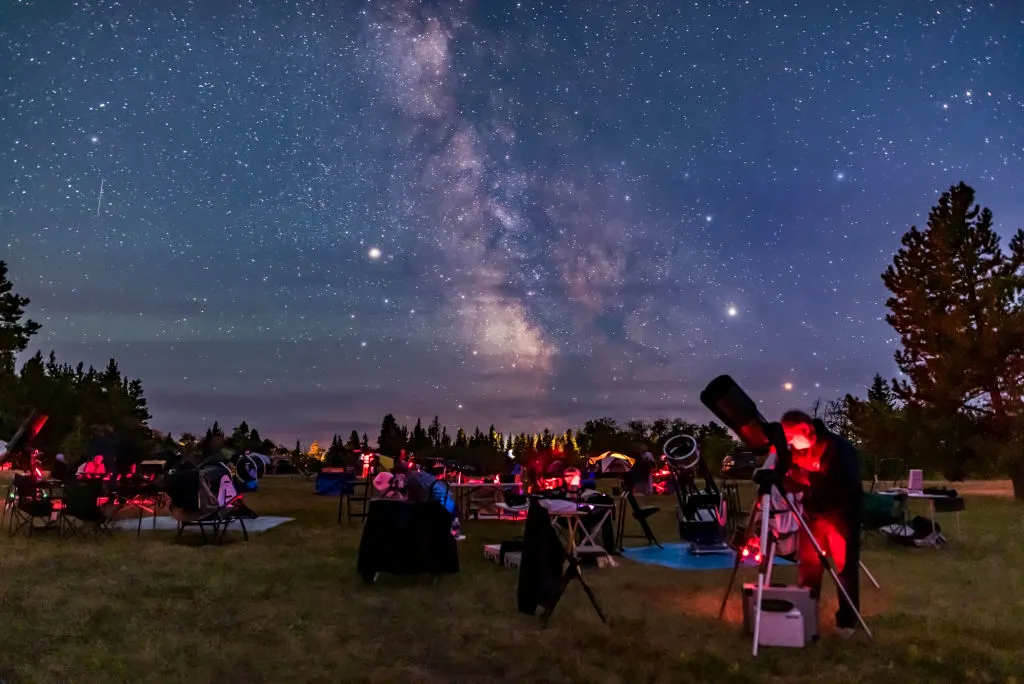Away from the city and looking up at the stars on a clear night, the quiet only disturbed by the occasional hoot of an owl, it can feel like our everyday stresses become lighter, even if only temporarily.
When you’re captivated by what’s in front of you, whether you’re observing with the naked eye or at the eyepiece of a telescope, negative emotions seem to dissipate.
If you're feeling under pressure, now could be the time to examine how stargazing can help improve your mental health and wellbeing.
For more advice, read our guide to astronomy for beginners and how to do stargazing

Science, stargazing and mental health
Scientific studies have repeatedly shown that spending time in nature, especially if you live and work in an urban setting, enhances positive emotions and reduces stress.
Even watching videos of natural environments has been found to reduce the physiological markers of stress, like high blood pressure.
But much of this research focuses on the daytime experience.
Once the Sun has set and the luscious greenery is cloaked in darkness, can stargazing and the night sky offer the same mental health benefits?

Stargazing and astronomy involve spending time in nature, even if it's just taking a nightwalk under the stars.
One study published in February 2024 found that people with a greater connection to the night sky had better mental health and felt happier.
Research also suggests that environments that are less visually arousing – meaning they are less complex or have little movement – offer better stress reduction than environments that are more stimulating.
The night sky can, of course, be stimulating and awe-inspiring, but this generally comes from our internal appreciation of the sights before us.
Even the busiest of meteor showers will feel more calming than watching the same number of cars speed down a motorway.

Lift your eyes, lift your spirits
Experiencing awe is beneficial for our mental health, according to Mampho Ledimo, a psychology and sociology student working on a project called Astronomy for Mental Health.
Feelings of awe have been shown to reduce inflammation, lower the heart rate and increase the presence of the hormone oxytocin, boosting positive emotions.
But one of awe’s most important implications is in our sense of self.
People with mental ill-health, such as depression, anxiety or eating disorders, can have an amplified self-focus.
Ruminating over worries, experiencing negative thoughts about themselves or believing that they’re personally responsible for bad things happening.
When we engage with something awesome, something bigger than ourselves, it helps reduce focus on the self.

"Thinking about the scale of the Universe, how old the Universe is, how old the Earth is… to some extent this can [help us] get rid of the idea that we have control over every single aspect of our lives," says Ledimo.
"It allows you to say, ‘you know what? I don’t have control over everything. I can only control the small things that I have influence over’."
Adrian West, astronomer and presenter of the Night Sky Show live events, calls this "a Band-Aid for the soul".
He notes that "when you’re looking out into the great unknown, you feel like your mundane earthly problems aren’t so important any more."

Stargazing and sense of community
Awe can also make us feel more connected to other people, whether friends or strangers.
The community provided by an amateur astronomy groups, for example, can offer respite from loneliness.
"The whole experience of being outside at night is enriched by being with other people and having a community of people around you," adds Ledimo.
You shouldn’t feel daunted about attending or worry that you won’t have enough knowledge, or that the only way to look at the stars is through an expensive telescope.
Most amateur astronomy clubs are a welcoming environment for all.
Equally, there’s something immersive – even powerful – about stargazing alone, says astrophysicist and Zen Yoga teacher Mark Westmoquette.
For him, spending time beneath the skies is a mindful practice, one in which he can let go of all judgement and feel the magic of being in time and space.
""And of course, we’re not really by ourselves," he points out. "We’ve got 6,000 stars above our heads."
4 tips for stargazing for your mental health
You don’t need equipment to reap the benefits of stargazing. Try these positivity-promoting tips.
Start small

There’s no need to sit outside for hours on end, waiting for a glimpse of a specific constellation or meteor shower. Even taking just 10 minutes to locate Orion’s Belt or notice the phase of the Moon each night can help to reduce stress.
Immerse yourself

While smartphone apps can help us name the things we’re seeing in the sky, our phones can also remind us of everyday stressors. To really be mindful, we need to focus on the sights and sounds in our present. Let your mind wander and remove any judgement from your thoughts: if you don’t know the correct name of the constellation, that’s okay.
Find a time that works for you

Staying up late or getting up early doesn’t work for everyone. Instead, find opportunities to appreciate the sky within your current routine. Look up while you’re putting the bins out or notice the colours that the setting Sun casts during your commute home. On the nights you have trouble sleeping, try looking out at the stars through a window.
Stay safe

Though stargazing has positive impacts on our mental health, it can also make us confront potentially anxiety-inducing concepts. If at any point you feel you need help, you can call the Samaritans mental health crisis service for free on 116 123 (UK).
This guide appeared in the May 2024 issue of BBC Sky at Night Magazine

